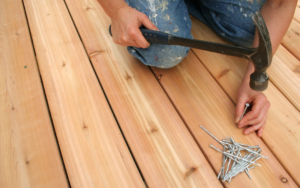Drywall Las Vegas is the standard for interior walls in most homes and commercial buildings. It is made from gypsum, a rock-like mineral with several popular properties.
Before drywall, lath and plaster were used to create walls, a labor-intensive process. Drywall cuts construction time and saves money. It also meets stringent fire codes and soundproof buildings.

Gypsum, also known as gypsum plasterboard, is an innovative building material that offers better fire and sound insulation than traditional plaster. Its unique construction consists of a non-combustible core and a paper surface that are held together with joint tape. This combination provides excellent structural integrity and allows for easy repairs. Drywalls are available in different thicknesses and sizes, ranging from 48 in. wide and 8 to 14 ft. long to meet different framing methods. They can be cut and shaped to fit any space or design.
In order to produce drywall, raw gypsum goes through a process of dehydration in which the water in the gypsum crystals evaporates. The resulting calcined gypsum is then mixed with several additives and spread onto Manila paper running on a conveyor belt. The gypsum is then heated at high temperatures to dry it out, forming a thick sheet that can be cut and shaped into the desired shape. It is also possible to create fire-resistant drywalls, which are designed for use in areas at a higher risk of fire damage.
Although gypsum is a soft mineral, it is highly versatile and durable. Its unique properties have made it a popular building material for thousands of years. Gypsum has the ability to absorb and retain heat, making it an ideal insulator, while its natural water content provides fire resistance. Special types of gypsum are also capable of reducing noise, helping to make homes more comfortable and private.
In addition, gypsum repurposed as an eco-friendly soil amendment benefits the environment by adding calcium and sulfur to the soil. This helps to strengthen plant cells and improve nutrient availability. It can be applied to vegetable gardens, flower beds and trees and shrubs, and is an effective way to help improve drainage, aeration and soil pH.
Paper
There are numerous different types of drywall products on the market, and knowing which one to use when completing a specific task can be challenging for many DIY enthusiasts. For example, when deciding whether to use an inside corner bead or paper tape, it is important for homeowners and professionals alike to have all the facts so they can make an informed decision and get the job done properly.
While paper tape has long been the go-to choice for drywall taping, it is not without its drawbacks. While it is inexpensive and easy to use, it does require a bed of joint compound added to the surface before application and can be difficult for novice tapers to achieve a smooth finish. Mesh drywall tape, on the other hand, offers superior strength and adhesion to joints. It also minimizes blisters and bubbles, resulting in a better quality finish. Plus, it works well with both setting-type and ready-mixed drywall mud, giving professional contractors and DIYers the flexibility to choose the best compound for their needs.
Another notable feature of mesh tape is that it’s self-adhesive, which makes it much faster and easier to install than paper. It is also mold-resistant, making it a suitable option for moist environments like bathrooms and basements. Some varieties even come with a crease in the middle, which makes it easy to fold into inside corners.
Several drywall manufacturers are introducing new products that are designed to be more eco-friendly. For example, green board is made from recycled materials and is more resistant to moisture than traditional white drywall. Additionally, a product called EcoRock was introduced in 2008 by Serious Materials and is said to have a zero carbon footprint.
Binders
Binders play a vital role in the production of drywall, as they provide strength and fluidity to the gypsum core. The most common binder used in gypsum board is a modified starch that is typically mixed with the gypsum to make the core. This essential additive also enhances the surface of the gypsum and provides a smooth finish for interior walls and ceilings.
Typical binders are made of organic (bitums, animal and plant glues) or inorganic materials such as gypsum, gypsum plasters, cement, clinker, and liquid glass. However, alternative binders such as CNF are becoming increasingly popular as they can be produced from renewable resources and are more environmentally friendly than the gypsum used in drywall manufacturing.
The gypsum used in drywall is usually a byproduct of pollution control on coal-fired power plants, and requires a lot of energy to process. The use of CNF in place of gypsum can significantly reduce the environmental impact of gypsum boards, as well as the carbon footprint of the construction industry.
In addition, a CNF-based binder can be used to produce more dense and high-strength gypsum panels that are characterized by good internal bonding. This is important for the development of sustainable building products and for reducing GWP 100a impacts on global warming potential.
Another benefit of using CNF-based binders is that they can be produced at a lower cost than gypsum and other alternative binders. This is because a much higher volume of gypsum and other fillers is needed to achieve the same density as conventional gypsum boards. Furthermore, the use of a higher proportion of fillers can result in a lower weight per sheet, which makes gypsum boards more efficient to transport and install.
Adhesives
Adhesives are a glue-like material that create bonds to hold materials together. They are also called cements or mucilage, and come in different forms and strengths. Glues can either be natural or synthetic, and they may be used for both structural or nonstructural bonding. They are also categorized as reactive or nonreactive, which refers to whether the adhesive chemically reacts in order to harden.
Structural adhesives are a type of industrial adhesive that is used to connect the surfaces of materials such as metals, plastics and composites. They are designed to withstand high loads and remain strong under adverse conditions, including extreme temperatures and humidity. They are typically more expensive than other types of adhesives, but they offer numerous advantages, including their ability to bind a wide range of materials and to withstand the effects of environmental stresses.
Nonstructural adhesives, on the other hand, are typically less expensive and more commonly used in construction, packaging and woodworking. They are able to transmit structural loads within design specifications, but they do not possess the same strength as structural adhesives.
Solvent-based and polymer dispersion adhesives are two common types of dry adhesives. The former is a mixture of ingredients that are dissolved in a solvent. White glue, contact adhesives and rubber cements are all examples of this type of dry adhesive. The latter is a milky-white dispersion often based on polyvinyl acetate.
In addition to different chemical compositions, forms, classifications, load bearing capacities and other properties, adhesives are also grouped by how they cure. For example, some of them require heat and pressure in order to harden, while others are cured by the moisture in the air. Additionally, some are also characterized by how easily they can be removed.
Finishing
In addition to being a quick and efficient building material, drywall can be an effective insulator. However, a quality installation requires skilled work in taping, mudding and sanding the seams and corners between panels. When these steps are not completed correctly, the result can be sloppy walls and ceilings that detract from the overall look of a space. This is why many contractors prefer to use a drywall finishing service instead of taking on the responsibility themselves.
The process of installing drywall starts with cutting the sheets to the size needed for each room or project. This can be done before starting the actual construction, or as a labor-saving measure on site, with a saw that can cut drywall boards along straight lines or even into curved spaces. Once the drywall is in place, it can be taped with either paper or fiberglass-mesh tape, and then three coats of joint compound are typically applied. This is sanded in between each coat, to smooth the wall and conceal any imperfections. There are also special corner bead products that can be used, which feature a paper flange on a metal bead that can be installed in interior corners to reduce the likelihood of a crack showing under paint.
The finish level a contractor chooses for the drywall will depend on how much time and expense the client is willing to spend on the project. The level of finish will also affect the cost of the materials and labor, and may dictate whether a contractor or subcontractor should be used to perform the work. Many construction specifications and cost estimation data publications, such as AIA MasterSpec, RS Means, and Xactimate, refer to the Gypsum Association levels of drywall finish, while others simply itemize descriptive finishes.


